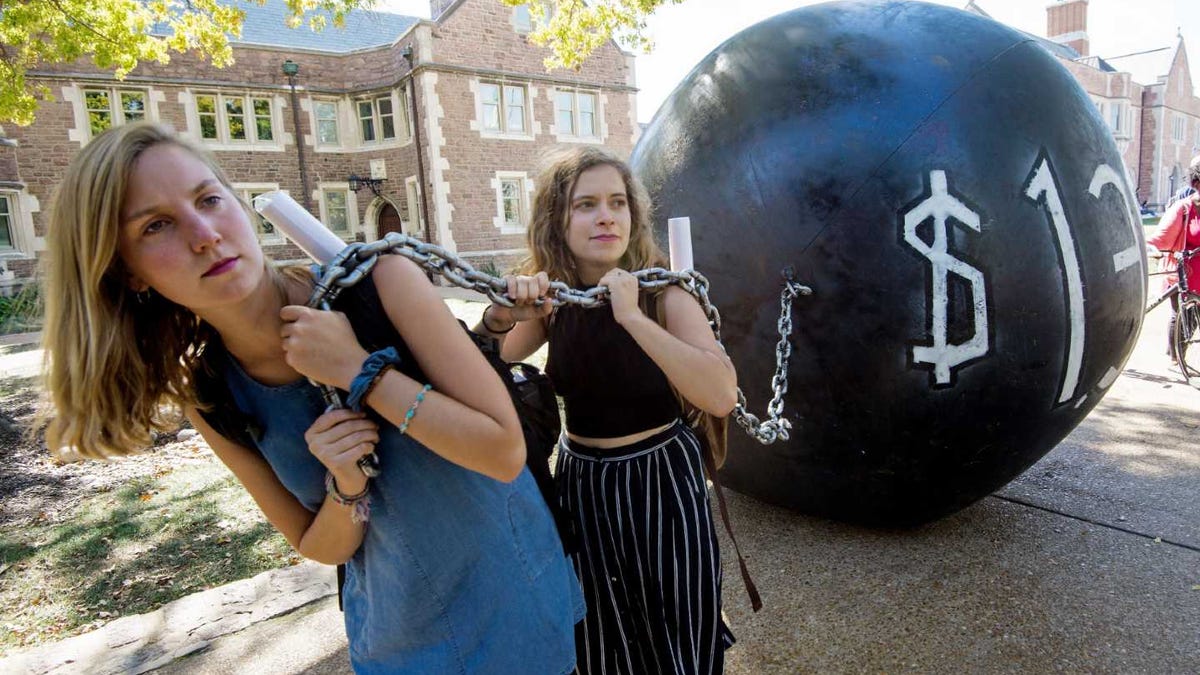The Morality of American Student Debt Cancellation
[ad_1]
President-elect Joe Biden has pledged to write off at least some student debt during his campaign, and he now supports the immediate cancellation of US $ 10,000 per borrower as part of COVID-relief measures. 19.
Such proposals are likely to be very popular. A 2019 poll found that 58% of voters support the cancellation of all federal student debt.
But there are those who question the idea of debt cancellation and call it unfair to those who have never incurred student debt or have already paid it off.
As an ethicist who studies the morality of debt, I see merit in the question: should student debt be canceled?
The moral case against cancellation
School debt is often seen as an investment in one’s future. Millennials with a bachelor’s degree, for example, typically earn $ 25,000 more than those with a high school diploma. A college education is also generally correlated with a variety of positive life outcomes, including physical and mental health, family stability, and job satisfaction.
Considering the benefits of a college education, student debt cancellation strikes some as a gift to those already on their way to becoming well-off.
Debt cancellation also appears to violate the moral principle of keeping promises. Borrowers have a moral duty to fulfill their loan contracts, argued the philosopher Immanuel Kant, because reneging on promises is disrespectful to oneself and to others. Once people promise to do something, it doesn’tNoted, others are building on this promise and expecting them to keep it.
In the case of federal student loans, a borrower signs a promissory note pledging to repay the government and, ultimately, the taxpayers. Thus, student borrowers appear to have a moral duty to pay off their debts, unless extenuating circumstances such as injury or illness arise.
The moral case of cancellation
Fairness and respect, however, also require society to address the scale of student debt today, and in particular the burdens it places on low-income, first-generation and first-generation borrowers. black.
Young people today start their adulthood with a lot more student debt than previous generations. Almost 70% of students now borrow to attend college, and their average debt load has increased since the mid-1990s, from less than $ 13,000 to around $ 30,000 today.
As a result, total student debt outstanding jumped to over $ 1.5 trillion, making it the second-largest form of debt in the United States after mortgages.
This explosion in student debt raises two important moral concerns, as my student Justin Lewiston and I argue in an article published last month by The Journal of Value Inquiry.
The first concern is that the distribution of costs and benefits is very unequal. Equity requires equal opportunity, as the philosopher John Rawls argued. Yet while borrowing for education is supposed to create opportunities for students from disadvantaged backgrounds, these opportunities often fail to materialize due to educational challenges and wage gaps in the labor market.
Data shows that low-income students, first-generation college students, and black students have a much harder time repaying their loans. About 70% of those failing are first generation students and 40% come from disadvantaged backgrounds. Twenty years after college, when white borrowers repaid 94% of their loans, the typical black student was only able to repay 5%.
These repayment and default rates reflect significantly lower graduation rates for students in these groups, who typically have to work long hours while also being in school and therefore engage less in the academic and non-academic aspects of the course. middle School.
But they also reflect significantly lower earnings after graduation for these students, largely due to persistent social and racial wage gaps in the labor market. Black men with a bachelor’s degree earn, on average, more than 20% less than white men with the same education and experience, although this wage gap is smaller for women. And first-generation graduates typically earn 10% less than students whose parents graduated from college.
A second moral concern is that student debt is increasingly causing widespread distress and significantly restricting life choices. Consider that even before the pandemic, 20% of student borrowers were behind on their payments, and first-generation borrowers and borrowers of color are struggling even more.
The financial distress indicated by this high rate of delinquency weakens both the physical and mental health of young adults. It prevents young adults from starting families, buying cars, renting or buying their own homes, and even starting new businesses.
Unsurprisingly, these negative effects are felt disproportionately by first-generation, low-income, black student borrowers, whose lifestyle choices are particularly limited by the need to repay their loans.
Avoid moral hazard
Some analysts have argued, however, that canceling student debt will create a moral hazard problem. Moral hazard occurs when people no longer feel the need to make wise choices because they expect others to cover the risk for them.
For example, a bank that expects to be bailed out by the government in the event of a financial crisis is therefore encouraged to adopt riskier behavior.
Moral hazard can be avoided by combining student debt cancellation with programs that reduce the need for future loans, especially for first-generation students, low-income students, and students of color.
One success story is the Tennessee Promise, a program promulgated in 2015 to make tuition and fees at community and technical colleges free for residents of the state. This program increased enrollment, retention and completion rates, while reducing borrowing by over 25%.
Ultimately, morality demands a forward-looking approach as well as a retrospective approach to debt cancellation.
Looking back at the original repayment promises may explain why people are usually required to pay their debts. But looking to the future will allow policymakers to imagine how canceling student debt could help create a more just society.
Kate Padgett Walsh is Associate Professor of Philosophy at Iowa State University. She wrote this for The Conversation.
[ad_2]


Comments are closed.